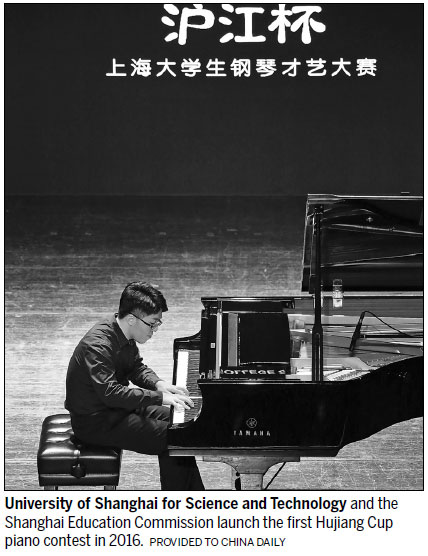Court upholds ruling over esteemed university name
|
Hujiang Education Technologies has advertised its business in public facilities in Shanghai, including office buildings and subway stations. Sun Zifa / China News Service |
Expert suggests more action among institutions to shield intangible assets
Shanghai High People's Court recently upheld a lower court ruling on a trademark dispute revolving around a much-honored university name that stretches back over a century.
The wrangle between University of Shanghai for Science and Technology and leading Shanghai-based online educational service provider Hujiang Education Technologies Co Ltd, involved the use of the trademark Hujiang.
The original University of Shanghai, founded in 1906, was also known as Hujiang University until 1952 when it was dispersed into other institutions - including today's University of Shanghai for Science and Technology.
According to its submission, USST has long identified itself as having evolved from Hujiang. It said in its bylaws that its history is given as dating back to Hujiang University founded in 1906. USST said that on its gate hangs two plaques - one is USST, the other Hujiang.
The Hujiang alumni association, which was founded in 1985, was renamed the USST alumni association in 2011.
The association still publishes the Hujiang Alumni News, which goes out to the school's staff and alumni.
By contrast, the internet company was founded in 2009 and renamed Hujiang EdTech in 2016. Its founder, Fu Cairui, studied at a foreign language school in USST from 1998 to 2005. He told Chinese media that his company's name came from Hujiang University, showing his esteem towards his alma mater.
Fu had applied for a series of trademarks related to Hujiang since 2006, which were granted from 2010 to 2015.
Evidence presented to the court showed that the company spent about 300 million yuan ($47 million) in advertising to promote its business in the name of Hujiang from April 2014 to July 2016.
USST filed a complaint against the company with the Shanghai Intellectual Property Court in 2016, claiming the latter infringed its unregistered yet well-known trademark which constituted unfair competition.
The Shanghai IP court ruled in August 2017 that the company was involved in unfair competition over false advertising, but there was no trademark infringement.
Both parties disputed the decision and lodged an appeal with the high court, which heard the case in January and ruled on the matter on April 18.
The judges said the key issues in the case were whether Hujiang was an unregistered, well-known trademark, whether using Hujiang as a business mark constituted unauthorized use of another business name, and whether the Hujiang company was involved in deceptive advertising.
The court found that USST uses Hujiang as a logo on its campus events and alumni publication.
Its foreign language training center, named after Hujiang, meets the needs of USST students, as well as a number of outside trainees. However the court found that with less than 1,000 trainees having gone through its doors in over three years, the center had not establish a high-level market reputation.
Therefore Hujiang could not be considered as unregistered well-known trademark, according to the court.
In addition, the court said that although Hujiang University and USST had certain historical connections, and USST has continued to use Hujiang in its name board, and in previous alumni association and departments' names, the school had no rights to Hujiang as a business logo.
The two parties in the case are both involved in the education industry and face competition from each other, the judges said.
The court found that the internet-based company had linked itself to Hujiang University, which had a misleading effect on the public by suggesting the two were affiliated. This constituted false advertising, the court said.
Ning Lizhi, head of the IP and competition law research institute at Wuhan University, told China Intellectual Property News that a higher learning institution's name, as a key intangible asset, has huge commercial value. He suggested universities and colleges protect their interests by making full use of the current legal framework.

(China Daily 05/03/2018 page17)















